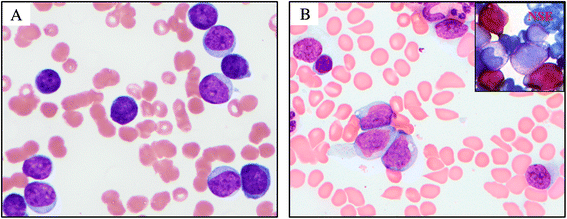Chromosomal rearrangement involving 11q23 locus in chronic myelogenous leukemia: a rare phenomenon frequently associated with disease progression and poor prognosis
- PMID: 25888368
- PMCID: PMC4396174
- DOI: 10.1186/s13045-015-0128-2
Chromosomal rearrangement involving 11q23 locus in chronic myelogenous leukemia: a rare phenomenon frequently associated with disease progression and poor prognosis
Abstract
Background: Progression of chronic myelogenous leukemia (CML) is frequently accompanied by cytogenetic evolution, commonly unbalanced chromosomal changes, such as an extra copy of Philadelphia chromosome (Ph), +8, and i(17)(q10). Balanced chromosomal translocations typically found in de novo acute myeloid leukemia occur occasionally in CML, such as inv(3)/t(3;3), t(8;21), t(15;17), and inv(16). Translocations involving the 11q23, a relatively common genetic abnormality in acute leukemia, have been seldom reported in CML. In this study, we explored the prevalence and prognostic role of 11q23 in CML.
Methods: We searched our pathology archives for CML cases diagnosed in our institution from 1998 to present. Cases with 11q23 rearrangements were retrieved. The corresponding clinicopathological data were reviewed.
Results: A total of 2,012 cases of CML with available karyotypes were identified. Ten (0.5%) CML cases had 11q23 rearrangement in Ph-positive cells, including 4 cases of t(9;11), 2 cases of t(11;19), and 1 case each of t(2;11), t(4;11), t(6;11), and t(4;9;11). Eight cases (80%) had other concurrent chromosomal abnormalities. There were 6 men and 4 women with a median age of 50 years (range, 21-70 years) at time of initial diagnosis of CML. 11q23 rearrangement occurred after a median period of 12.5 months (range, 0-172 months): 1 patient in chronic phase, 2 in accelerated phase, and 7 in blast phase. Eight of ten patients died after a median follow-up of 16.5 months (range, 8-186 months) following the initial diagnosis of CML, and a median of 6.7 months (range, 0.8-16.6 months) after the emergence of 11q23 rearrangement. The remaining two patients had complete remission at the last follow-up, 50.2 and 6.9 months, respectively. In addition, we also identified a case with 11q23/t(11;17) in Ph-negative cells in a patient with a history of CML. MLL involvement was tested by fluorescence in situ hybridization in 10 cases, and 7 cases (70%) were positive.
Conclusions: In summary, chromosomal rearrangements involving 11q23 are rare in CML, frequently occurring in blast phase, and are often associated with other cytogenetic abnormalities. These patients had a low response rate to tyrosine kinase inhibitors and a poor prognosis.
Figures
Similar articles
-
Fulminant blast crisis with de novo 11q23 rearrangement in a Philadelphia-positive CML patient undergoing treatment with dasatinib.Tumori. 2019 Dec;105(6):NP8-NP11. doi: 10.1177/0300891619839473. Epub 2019 Apr 1. Tumori. 2019. PMID: 30935343
-
Clinical and biological characteristics of adult de novo and secondary acute myeloid leukemia with balanced 11q23 chromosomal anomaly or MLL gene rearrangement compared to cases with unbalanced 11q23 anomaly: confirmation of the existence of different entities with 11q23 breakpoint.Leukemia. 1998 Jan;12(1):25-33. doi: 10.1038/sj.leu.2400853. Leukemia. 1998. PMID: 9436917
-
Multicolor COBRA-FISH analysis of chronic myeloid leukemia reveals novel cryptic balanced translocations during disease progression.Genes Chromosomes Cancer. 2002 Oct;35(2):127-37. doi: 10.1002/gcc.10099. Genes Chromosomes Cancer. 2002. PMID: 12203776
-
Cytogenetic and molecular genetic evolution of chronic myeloid leukemia.Acta Haematol. 2002;107(2):76-94. doi: 10.1159/000046636. Acta Haematol. 2002. PMID: 11919388 Review.
-
Ph-negative non-Hodgkin's lymphoma occurring in chronic phase of Ph-positive chronic myelogenous leukemia is defined as a genetically different neoplasm from extramedullary localized blast crisis: report of two cases and review of the literature.Leukemia. 2000 Jan;14(1):169-82. doi: 10.1038/sj.leu.2401606. Leukemia. 2000. PMID: 10637493 Review.
Cited by
-
Philadelphia chromosome-negative acute myeloid leukemia with 11q23/MLL translocation in a patient with chronic myelogenous leukemia.Stem Cell Investig. 2015 Jul 1;2:13. doi: 10.3978/j.issn.2306-9759.2015.06.01. eCollection 2015. Stem Cell Investig. 2015. PMID: 27358881 Free PMC article.
-
Prognostic significance of additional chromosomal abnormalities at the time of diagnosis in patients with chronic myeloid leukemia treated with frontline tyrosine kinase inhibitors.Am J Hematol. 2018 Jan;93(1):84-90. doi: 10.1002/ajh.24943. Epub 2017 Nov 9. Am J Hematol. 2018. PMID: 29027261 Free PMC article.
-
Coexistence of recurrent chromosomal abnormalities and the Philadelphia chromosome in acute and chronic myeloid leukemias: report of five cases and review of literature.Mol Cytogenet. 2020 Aug 19;13:34. doi: 10.1186/s13039-020-00501-6. eCollection 2020. Mol Cytogenet. 2020. PMID: 32831907 Free PMC article.
-
[The significance of non-Ph chromosome in chronic myelogenous leukemia].Zhonghua Xue Ye Xue Za Zhi. 2020 Aug 14;41(8):701-704. doi: 10.3760/cma.j.issn.0253-2727.2020.08.018. Zhonghua Xue Ye Xue Za Zhi. 2020. PMID: 32942830 Free PMC article. Chinese. No abstract available.
-
Pediatric acute myeloid leukemia patients with i(17)(q10) mimicking acute promyelocytic leukemia: Two case reports.World J Clin Cases. 2022 Jun 6;10(16):5446-5455. doi: 10.12998/wjcc.v10.i16.5446. World J Clin Cases. 2022. PMID: 35812654 Free PMC article.
References
MeSH terms
LinkOut - more resources
Full Text Sources
Other Literature Sources
Medical
Research Materials


